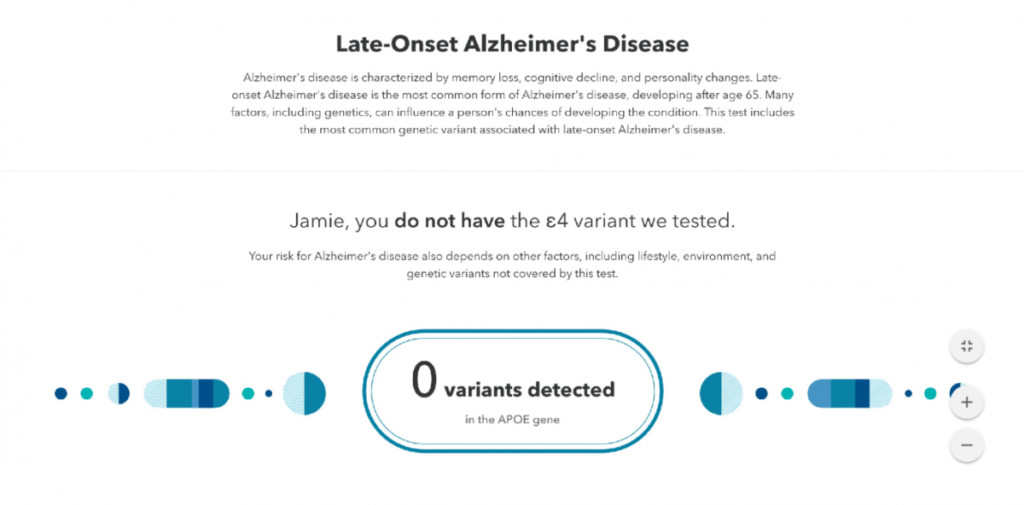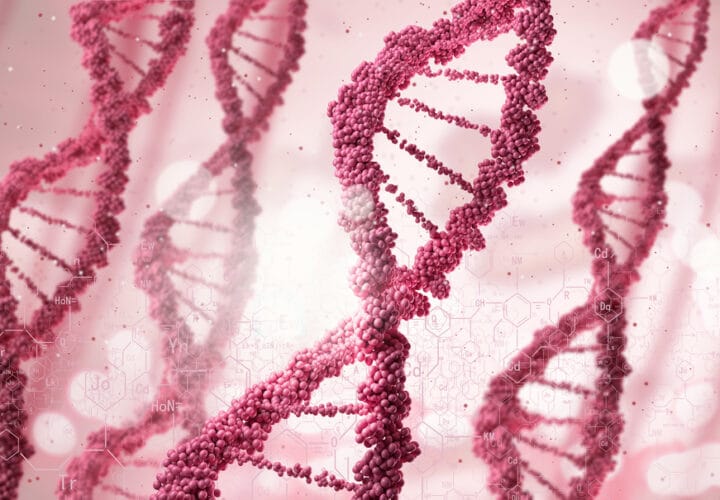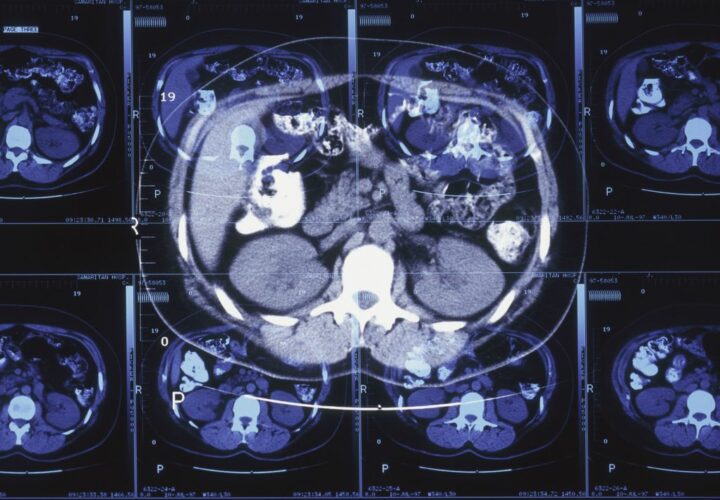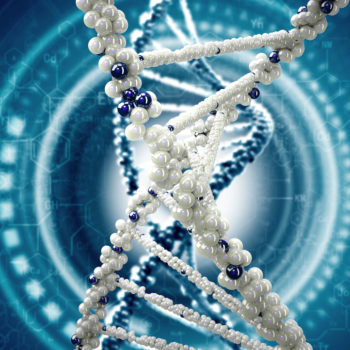“It’s not destiny. It’s an opportunity.”
Almost everyone who knows they carry the Alzheimer’s gene finds out the same way: sitting at a computer, poring intently over a screen that divulges the contents of their genes. For people like Dina Kasper, who have seen what this incurable disease can do to family members, that information can be devastating.
“I kept seeing ‘Alzheimer’s increased risk’ pop up over and over and over again,” said the 42-year-old. “I recall thinking to myself, ‘This is what I’m going to die from.’”
Genetic Tests for the ApoE4 Gene
Kasper is one of millions who signed up for a new wave of genetic tests offering to illuminate everything from your ancestry to chances of developing macular degeneration or Alzheimer’s. 23andMe began providing data on diseases to customers in 2008, but the F.D.A. slapped the company with a moratorium on the disease tests in 2013. That ban was removed in April 2017, and the reports are available for customers who took the test when the ban was in place.
By simply sending off a saliva sample to companies like 23andMe, curious consumers can find out if they are carriers of one or two alleles of the ApoE4 gene, the genotype that puts them at a higher risk of Alzheimer’s disease, for $199. What that fee doesn’t include is genetic counseling. Many consumers feel initial shock, confusion and depression when they’re hit with an unexpected ApoE4 gene status.

Kasper, a scientist specializing in oncology, took the test to determine her risk for cancer. She was shocked by the results. Despite a family history of dementia, Alzheimer’s had been far from her mind. But after the initial scare, Kasper decided to carry on with her life as usual, determined the findings would not rule the way she lived.
“If it was as simple as becoming a vegan, I might,” said Kasper. “But there’s nothing I can do.” Still, there are questions that she hasn’t addressed yet. She can remember watching her grandfather decline, and how hard it was for her family to decide when it was time for him to have more involved care. Kasper says she doesn’t want to put her family through a drawn-out care process once the disease takes hold, but hasn’t put a lot of thought into how or if she would choose the right to die. “With Alzheimer’s, there’s no line in the sand,” said Kasper. “Ethically speaking, it’s extremely hard.”
Carrying one copy of ApoE4 increases your risk by three times. Carrying two, like Braymer and two percent of the population, increases the risk of Alzheimer’s up to 12 times.
Fighting Back Against the ApoE4 Gene
Others have decided to fight back against their genetic destiny. Theresa Braymer, 58, had no known family history of Alzheimer’s but decided to take a genetic test after her now-husband took one. The results showed she had a double, or homozygous, ApoE4 allele. In the general population, one in ten adults develops Alzheimer’s by 65. Carrying one copy of ApoE4 increases your risk by three times. Carrying two, like Braymer and two percent of the population, increases the risk of Alzheimer’s up to 12 times. Braymer, a retired Navy officer, wasn’t plunged into the depression that blindsides many armed with this knowledge. “I thought, ‘Wow, that sucks,” Braymer recalled. But what followed was a steely resolve to do something about it.
Braymer began to make changes. She used to be vegan but now eats fish because omega-3 fatty acids are associated with a lower risk of Alzheimer’s. She exercises more. She checks in twice a year with bestselling author Dr. Steven Gundry, whose practice in Palm Springs focuses on nutrition and lifestyle. She even incorporates intermittent fasting into her diet.
“My husband and I, we’ve been making sure we live our lives. We go travel. We go do things. Not to say our time here is short, but we’re making the best of it,” said Braymer.
The Mental and Emotional Effect of Knowledge of the ApoE4 Gene
For some, knowledge of an increased risk of Alzheimer’s can be debilitating. A 2011 survey by Alzheimer’s Research UK found that the disease was even more feared than death and cancer. Sherri, who did not want her full name used because she has relatives who don’t want to know their Alzheimer’s risk, found out her four-four status, as members of the ApoE4 community call the double ApoE4 variant, five years ago. Like Kasper, she took the test because she was worried about her cancer risk — her father had malignant melanoma and died of bladder cancer. “I was sure that I was carrying it,” said Sherri. She wasn’t. Instead, she found out she had 12 times the risk of developing Alzheimer’s disease. “I was completely devastated,” she recalled. “I think I had PTSD for three years.”
The trouble with the Alzheimer’s genetic test, explains counselor Susan Hahn of the National Society of Genetic Counselors, is that it’s not a sure thing. “You can’t hang your hat on the ApoE4 test,” said Hahn. The ApoE4 gene indicates susceptibility, but by no means predicts with certainty whether someone will get Alzheimer’s, and for that reason, Hahn says, it usually does more harm than good.
“Most of the time we do genetic testing to help save lives, help an outcome or help people make life decisions. All the people with ApoE4 can really do is worry.”
—Susan Hahn, Genetic Counselor
Compared to Huntington’s disease, another degenerative disease that has no cure and no preventative treatment, Alzheimer’s is not a certainty. “For Huntington’s, there’s a genetic test and we know you will develop it in your lifetime,” said Hahn. People with the gene for Huntington’s may make different life choices if they know they will develop an incurable brain disease in their middle age, she added, like deciding against going to medical school or having children. But the ApoE4 gene is common: around 25 percent of the population has it. “You’re not going to not have children because you have a copy of the ApoE4,” said Hahn.
“Most of the time we do genetic testing to help save lives, help an outcome, or help people make life decisions. All the people with ApoE4 can really do is worry,” said Hahn.
Carrying the ApoE4 Gene Does Not Mean Alzheimer’s Is Inevitable
The limitations of genetic testing became clear to Sherri when the friend who had first encouraged her to get tested was later diagnosed with Parkinson’s. It was a disease that hadn’t shown up on her test. It was a lightbulb moment for Sherri. “Just because you have a risk for something, doesn’t mean you’re going to get it,” she said, having just learned that a test showing no risk didn’t leave you immune. Even in the general population, the risk of Alzheimer’s is about 15 percent, rising to 50 percent once a person turns 80 years old.
Genetic testing also throws up other dilemmas. One crucial unknown is the impact knowledge of a genetic status could have on a person’s ability to buy health insurance. While insurance companies don’t currently discriminate based on genetic test results, Hahn isn’t sure that will always be the case. “If they start to suspect it’s hurting their bottom line that could start to shift,” said Hahn. “I don’t think anyone should be reassured just because they’re not doing it now.”
“It’s not destiny. It’s an opportunity.”
—Theresa Braymer
There are others who fear the stigma of having a predisposition to a disease. Matt, a retired doctor in Florida, says his brother, a fellow doctor, was too afraid to disclose his positive ApoE4 status in case it affected patients’ perceptions of his work. Knowing that, Matt did not want to use their shared last name.
For Matt, deciding to get the test was easy — he’s a doctor who relies on science to make decisions — but he acknowledged that not everyone would respond positively to the results. “The question was, you’re gonna go down one path or the other, and how is that going to change [by seeing the results],” said Matt. “In the end, I decided to have knowledge, because having it is to have a certain amount of power over your future.”
The results showed he was negative for the ApoE4 gene but also uncovered a metabolic disorder, a discovery that prompted him to make changes to his life. “I ride a bike everywhere. I go to the gym once or twice per week. I avoid foods which can increase risk for obesity and diabetes,” said Matt. If the ApoE4 test was positive, he said he would have looked into long-term care insurance. “I would even consider moving to an area where it was permitted to have euthanasia,” he said.
Easy access to a new generation of affordable genetic tests has started to change the way people think about their future. For Braymer, getting tested has been a positive awakening.
“I do feel generally better,” said Braymer. “My inflammatory markers are drop dead gorgeous. My triglycerides are lower than they’ve ever been,” she said. Knowledge of her double ApoE4 gene no longer feels like a genetic curse just waiting to strike. “It’s not destiny,” said Braymer. “It’s an opportunity.”
[ Next: ‘I Have A 50 Percent Chance of Getting Alzheimer’s By Age 50.’ How Genetics Changed One Man’s Life ]




Where can I get this testing done? How much does it cost? My father & 4 siblings died in thier 60’s with ALZ. My dads father also died with this disease.
Thanks for this.
My mother had Alzheimer’s.And got it around my age. Now I have it. It’s the early signs. It’s scaring me to death. I’m so paranoid about people not having anything to do with me. I feel alone. Don’t no where to turn. Worried because I don’t want to be taken care of. I don’t have anyone to take care of me. I want the right to die when I want to die. But I’m told by an elder in my church that it’s like suicide .5 states are already have this as a law. I love my God and don’t want to do anything that he would consider a sin. I’m in a real dilemma .
Sharon, please do not despair. I am 71 years old with with two of the APOE4 alleles which gives me a very high risk for developing the disease. My grandfather and his two sisters as well as my mother and five of her cousins had the disease. I recommend that you read The End of Alzheimer’s by Dale E. Bredesen MD. In it he explains the three different types of the Alzheimers and explains his RECODE (Reverse Cognitive Decline) protocol. He had very good results with all but one of 100 patients who followed the plan which offers diet, supplement, and other advice. Those that have early Alzheimer’s seem to have reversed, or at least stopped the progress, of the disease. There are now over 800 of us following the protocol to various degrees. Please consider joining the APOE4.info group. You will receive a lot of support from these people. Not everyone has the APOE4 alleles. I have joined, but not introduced myself to the group as yet. I’m still lurking! I hope you read this and know there is still hope for you at this early stage. Please, please, read the book. It, at least, offers us hope. You are not alone and there are many of us who understand how you feel.
Thank you for sharing